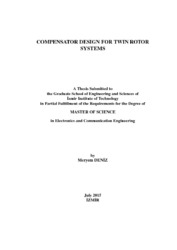Please use this identifier to cite or link to this item:
https://hdl.handle.net/11147/4440Full metadata record
| DC Field | Value | Language |
|---|---|---|
| dc.contributor.advisor | Tatlıcıoğlu, Enver | - |
| dc.contributor.author | Deniz, Meryem | - |
| dc.date.accessioned | 2015-12-28T09:32:43Z | - |
| dc.date.available | 2015-12-28T09:32:43Z | - |
| dc.date.issued | 2015-07 | - |
| dc.identifier.citation | Deniz, M. (2015). Compensator design for twin rotor systems. Unpublished master's thesis, İzmir Institute of Technology, İzmir, Turkey | en_US |
| dc.identifier.uri | http://hdl.handle.net/11147/4440 | - |
| dc.description | Thesis (Master)--Izmir Institute of Technology, Electronics and Communication Engineering, Izmir, 2015 | en_US |
| dc.description | Full text release delayed at author's request until 2017.08.27 | en_US |
| dc.description | Includes bibliographical references (leaves: 42-46) | en_US |
| dc.description | Text in English; Abstract: Turkish and English | en_US |
| dc.description | xii, 46 leaves | en_US |
| dc.description.abstract | In this thesis study, modeling and control of the in-house developed twin rotor systems are aimed. Firstly, two input-output models are obtained by using experimentally collected data. One model is obtained as transfer functions in the Laplace domain while the other is a neural network based model. Nextly, lag and lead type compensators are designed and then experimentally verified on the twin rotor system. Specifically, first, lag and lag-lag compensators are designed to obtain a reduced steady state error when compared with proportional controllers. Secondly, lead compensation is discussed to obtain a reduced overshoot. Finally, to make use of their favorable properties at the same time, lag-lead compensators are designed. All the compensators are applied to the twin rotor system in our laboratory. | en_US |
| dc.description.abstract | Bu tezde laboratuvarımızda geliştirilmiş olan çift rotorlu sistemin modellenmesi ve denetimi amaçlanmıştır. Deney düzeneğinden toplanan veriler kullanılarak sistemin dikey ve yatay eksende modellenmesi yapay sinir ağı tabanlı modelleme ve transfer fonksiyonu şeklinde ifade edilmektedir. Daha sonra lag ve lead düzenleyiciler tasarlanıp laboratuvarımızda bulunan çift rotorlu sistem üzerine bu düzenleyiciler uygulanmaktadır. Öncelikle lag düzenleyici tasarlayıp sisteme uyguladıktan sonra sistemin kalıcı durum hatasının oransal denetleyiciye göre azaldığı gözlemlenmektedir. Bu ölçüde lag-lag düzenleyici tasarlayıp sistemin kalıcı durum hatasının daha küçük değerlere ulaştığı görülmektedir. Daha sonra lead düzenleyici tasarlayarak sistemin aşma değerinin düşürülmesi amaçlanmaktadır. Hem lag hem de lead düzenleyicinin özelliklerinden faydalanmak için lag-lead düzenleyici tasarlayarak sistemin hem kalıcı durum hatasını azaltmak hem de aşma değerini düşürmek hedeflenmiştir. Tasarlanan tüm düzenleyiciler laboratuvarımızda bulunan çift rotorlu sisteme uygulanarak deneysel gerçeklenme sağlanmaktadır. | en_US |
| dc.description.sponsorship | TÜBİTAK grant number 113E147 and IYTE University Research Grant Commission under grant number 2010-IYTE-15 | en_US |
| dc.language.iso | en | en_US |
| dc.publisher | Izmir Institute of Technology | en_US |
| dc.rights | info:eu-repo/semantics/openAccess | en_US |
| dc.subject | Rotors | en_US |
| dc.subject | Compensators | en_US |
| dc.subject | Twin rotor system | en_US |
| dc.subject | Electric controllers | en_US |
| dc.title | Compensator design for twin rotor systems | en_US |
| dc.title.alternative | Çift Rotorlu Sistemler için Düzenleyici Tasarımı | en_US |
| dc.type | Master Thesis | en_US |
| dc.institutionauthor | Deniz, Meryem | - |
| dc.department | Thesis (Master)--İzmir Institute of Technology, Electrical and Electronics Engineering | en_US |
| dc.relation.publicationcategory | Tez | en_US |
| dc.identifier.wosquality | N/A | - |
| dc.identifier.scopusquality | N/A | - |
| item.languageiso639-1 | en | - |
| item.openairecristype | http://purl.org/coar/resource_type/c_18cf | - |
| item.grantfulltext | open | - |
| item.openairetype | Master Thesis | - |
| item.fulltext | With Fulltext | - |
| item.cerifentitytype | Publications | - |
| Appears in Collections: | Master Degree / Yüksek Lisans Tezleri | |
Files in This Item:
| File | Description | Size | Format | |
|---|---|---|---|---|
| T001371.pdf | MasterThesis | 957.83 kB | Adobe PDF |  View/Open |
CORE Recommender
Page view(s)
384
checked on May 12, 2025
Download(s)
126
checked on May 12, 2025
Google ScholarTM
Check
Items in GCRIS Repository are protected by copyright, with all rights reserved, unless otherwise indicated.